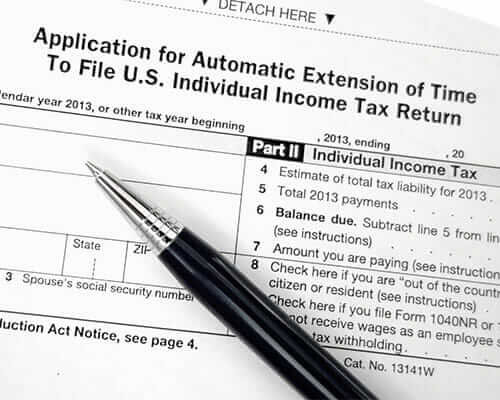If you are currently going through a divorce in Arizona, there are some important things that you should know about filing your taxes. You will only be allowed to file a joint income tax return with your spouse for this tax year if you are still married on Dec. 31 and your spouse agrees to file your return jointly for the year. If both of these factors apply, you can check the married filing jointly box on your tax return.
Filing a joint return allows you to a larger exemption than if you file separately or as a single filer. If you are not divorced but are separated at the end of the tax year, you will qualify to file a joint tax return since there will not be a final divorce decree in your case that ends your status as a married person. However, if your divorce is finalized before Dec. 31, you and your spouse will need to file your own separate returns and will not be able to file a joint return.
Filing Taxes While Legally Separated vs. Divorced
If you are legally separated from your spouse but have not received your Decree of Separate Maintenance, you will still be married. The orders that you receive for the division of your property, custody of your children, and child and spousal support will not affect your tax filing status. Since you will not have a final order from the court that ends your marriage, the IRS considers you to be married. However, if you have an order of separate maintenance by the end of the tax year, you can choose to file your tax return as single or as a head of household, according to IRS publication 504. However, if you and your spouse are able to agree to file a joint return, it might be a good idea. Each of you will likely pay higher taxes if you file separate returns.
Talking About How to File Your Tax Return
When you are going through a divorce, both you and your spouse may have trouble talking to each other about anything. It might seem hard to imagine discussing the pros and cons of filing a joint return. It is a good idea for you to talk to your tax preparer and your divorce lawyer about filing a joint income tax return. In most cases, the taxes will be lower for joint returns. However, depending on your deductions, respective incomes, and credits, you and your spouse might be better off filing separate returns.
A major disadvantage of filing a joint return is that you and your spouse will both be liable for taxes that may be owed on the tax return. If your spouse fails to pay his or her portion of any tax liabilities, the IRS will go after you to recover what is owed. You can take steps to protect yourself in the case that your spouse fails to pay his or her portion of the taxes by entering into a tax indemnification agreement with him or her. There might also be some relief available to you from the IRS. There are three types of tax relief that the IRS offers to spouses who have filed joint returns, including the following:
- Innocent spouse relief
- Equitable relief
- Separation of liability
We will discuss tax indemnification agreements and the three types of tax relief that you might be able to claim further below.
Q: What Happens When Your Spouse Refuses to Sign a Joint Tax Return?
In your case, your divorce lawyer might try to secure an agreement from your spouse to file your taxes jointly. However, both of you must agree to file jointly for it to occur. Courts do not order people to file joint returns when they are unwilling to do so. The IRS will rarely accept joint returns that are only signed by one of the spouses. To learn whether the agency might agree to accept a joint return that your spouse has refused to sign, you can talk to the IRS or ask a tax lawyer. Since this is unlikely, however, you may have to go ahead and file a separate return or to file as single or head of household.
Protecting Yourself When You File a Joint Return
If you do agree to file a joint tax return with your estranged spouse, there are steps that you should take to protect yourself. In your settlement agreement, you should include how refunds and tax debts from the joint return will be handled. If you will ask the IRS to mail a check, it should be written as payable to both of you jointly. If it will be paid by direct deposit, have it deposited into a joint account or write an agreement that tells the other person to pay you your share.
You will not have to agree to share a refund or to pay the tax debts equally. If you are able to agree, you and your spouse can decide how to divide debts or refunds in a way that is fair and that follows the way in which your property is divided. It is important for you to include how the tax refunds or liabilities will be handled in a clearly written settlement agreement. Many couples decide to use a ratio based on each of their incomes to prorate tax debts that are owed so that they are divided fairly.
If you plan to file a joint tax return, it is a good idea for you to write a tax indemnification agreement. This type of agreement may be used to protect a spouse who does not prepare the return and states that the spouse who does prepare it will be liable for tax liabilities that arise from the jointly filed return. If you think that your spouse will not be able to prepare the tax return accurately, you should avoid allowing him or her to prepare a joint return. Instead, you should either agree to hire a tax professional to prepare your joint return or choose to file separate returns.
Filing Statuses When You Don’t File Jointly
If you and your spouse cannot agree to file a joint return, you will have to file either as married filing separately, head of household, or single. If you are able to file as head of household, you will be allowed to claim the higher standard deduction for that status as well as to claim certain credits such as the earned income credit and the dependent care credit. People who are able to file as head of household may pay lower taxes. In order to file under this status, you must meet the following criteria:
- You must have paid more than 50% of your housing costs during the tax year, including your mortgage or rent, taxes, utilities, insurance, and food;
- Your spouse must not have lived with you in your home during the final six months of the year;
- Your child, eligible foster child, or stepchild must have lived in your home for more than 50% of the year; and
- You must be allowed to claim your child as your dependent.
If you file your tax return as a head of household, your spouse will have to file his or her return as married filing separately. As long as you continue to meet the requirements, you can continue filing your tax returns as head of household in your subsequent tax years after your divorce is final.
You and your spouse can also choose to file married filing separately. However, filing your tax returns in this way may result in both of you owing higher taxes. People who file separate returns may also be unable to claim certain deductions for which they would otherwise be eligible.
Q: Can I get an Extension Until my Divorce is Final?
As long as you request an extension by the tax filing deadline, the IRS will automatically grant one to you for any reason. The extension is only for six months, however. If your divorce is not finalized within that time period, you will need to go ahead and file your tax returns. The IRS will not give an additional extension simply because your divorce has not been finalized. If you and your spouse cannot agree on how to file or how to handle your tax liabilities and any refund that you might be owed, go ahead and file separately. It is not a good idea to file an extension simply to wait for your divorce to be finalized, however. If you end up owing tax liabilities when you file your return at the end of the extension period, you will have to pay interest and penalties on the amount that you owe.
Q: What if My Ex-spouse Fails to Pay their Tax Liabilities from a Joint Return?
As previously discussed, it is important for you to include clear information in your settlement agreement or divorce decree about how tax liabilities that might arise from a joint return will be handled. When you file a joint return, the IRS considers both you and your spouse to be jointly and severally liable for any tax debts that are owed. This means that the IRS will try to collect the tax liabilities from you if your spouse refuses to pay what he or she owes.
If your ex-spouse fails to pay in violation of your agreement, you can file a motion with the family court to obtain an order for him or her to pay you what is owed. However, you will still need to go ahead and pay it to the IRS while you wait to be indemnified by your ex-spouse.
According to IRS Publication 971, you can also apply for innocent spouse relief, equitable relief, or separation of liability. Innocent spouse relief is granted in cases in which your former spouse made errors or omissions on your joint tax return that resulted in liability. Separation of liability relief can be granted if your spouse understated his or her income. in this type of relief, the IRS will determine the percentage of tax liability to allocate to each of you so that you will be responsible for only paying your share. Finally, you can ask the IRS for equitable relief if you do not qualify for innocent spouse relief or for separation of liability relief.
Get Help from a Divorce Attorney
When you are dealing with tax issues related to a divorce, it is a good idea for you to talk to an experienced divorce lawyer at Cantor Law Group. We can help you to determine which filing status might offer you the most benefits. We can also negotiate with your estranged spouse to secure an agreement about how any refunds or tax debts will be handled.
Call us today at (602) 254-8880 to schedule a consultation.



